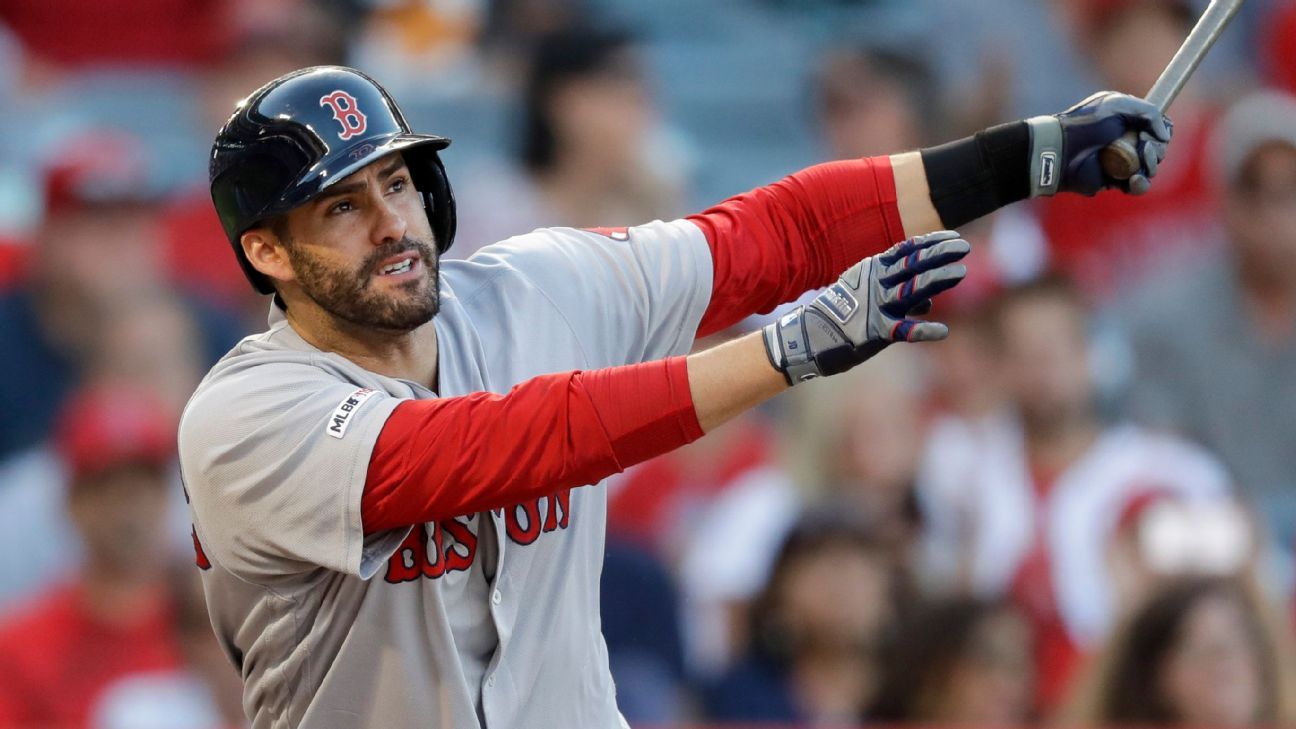FORT MYERS, Fla. — The passionate reaction around baseball regarding the Astros‘ sign-stealing scandal continues to capture the attention of the sport, with stars like Justin Turner and Mike Trout speaking out against MLB’s punishment of Houston on Monday, but Red Sox designated hitter J.D. Martinez said he believes the discourse around baseball was “getting a little bit too much.”
“I understand players’ frustrations and stuff like that, but I think in my opinion, it’s already getting a little bit too much,” Martinez said. “We have to move past it at some point. We can’t continue to talk about it. I know it’s frustrating right now. People want to talk about it, this and that, but it’s 2020. I think teams are aware of everything that’s kind of happened.
“… From here on out, it’s going to be a different message in the clubhouses and a different environment with people, like steroids. The punishments were so harsh that people weren’t going to attempt to think about doing anymore. I think it will get to that point.”
Martinez, 32, a three-time All-Star and Silver Slugger Award winner, also defended MLB commissioner Rob Manfred’s decision to grant the players immunity, saying that the facts of the situation would not have emerged otherwise.
“One hundred percent they wouldn’t have,” Martinez said. “That’s the way it is. There was never any hard core facts that were jumping out at you. If it weren’t for players talking and getting that immunity, I don’t think no one would have ever have said anything.”
Martinez’s comments come as the Red Sox await their fate in MLB’s investigation of alleged sign stealing during 2018 World Series title year. Manfred said Sunday that a decision could come within the next week.
Martinez did, however, take issue with the announcement from Manfred that MLB is in talks with the players’ union to further restrict in-game use of video, such as when hitters go to the clubhouse to review their at-bats before returning to the dugout.
“I think it’s really important for us to send a message to our fans,” Manfred said, “that not only did we investigate and punish, but we altered our policies in a way to help make sure it doesn’t happen again.”
The Boston designated hitter uses video extensively in his preparation, recording every swing during batting practice and routinely breaking down footage to check for any irregularities in his swing, playing a major role in his success following his release from the Astros before the 2014 season.
“He said there are going to be some restrictions, but I think to go out there and take all video out and you’re not allowed to look at at-bats, I think is a little ridiculous in my opinion,” Martinez said. “All of these kids now, when I was in the minor leagues, Double-A, Triple-A, we had video systems. … You always go back and check something in your swing and it helps you throughout the game. To all of a sudden take that away is a little extreme.”
Martinez continued: “The way the at-bat system works is like you’re watching the game live from NESN. You watch it on NESN, can you steal the signs? It’s too hard. It’s cutting in and out. There’s a guy eating a sausage and they’re talking about him eating a hot dog and this sausage and then all of a sudden … there’s the pitch. I think it’s a little bit extreme to say all of that.
“Maybe they should become more informed on what exactly you can do and talk to players who have played. ‘Hey, does this help? How can we monitor it?’ If you want to delay it, delay it, whatever you have to do, but to sit there and take that away, for me, it’s what makes me, me. I’m a very analytical guy. I like to study what my back foot is doing, my elbow. There’s a lot of guys who are like that, and that’s the trend of the game and the way the game has gone.”
Martinez also suggested that limiting access to video could diminish the offensive production on the field.
“You start taking angles away, you’re just making it harder,” Martinez said. “What does the commissioner want? More offense, more offense, but you’re going to limit hitters for doing that? I think it’s tough.”
